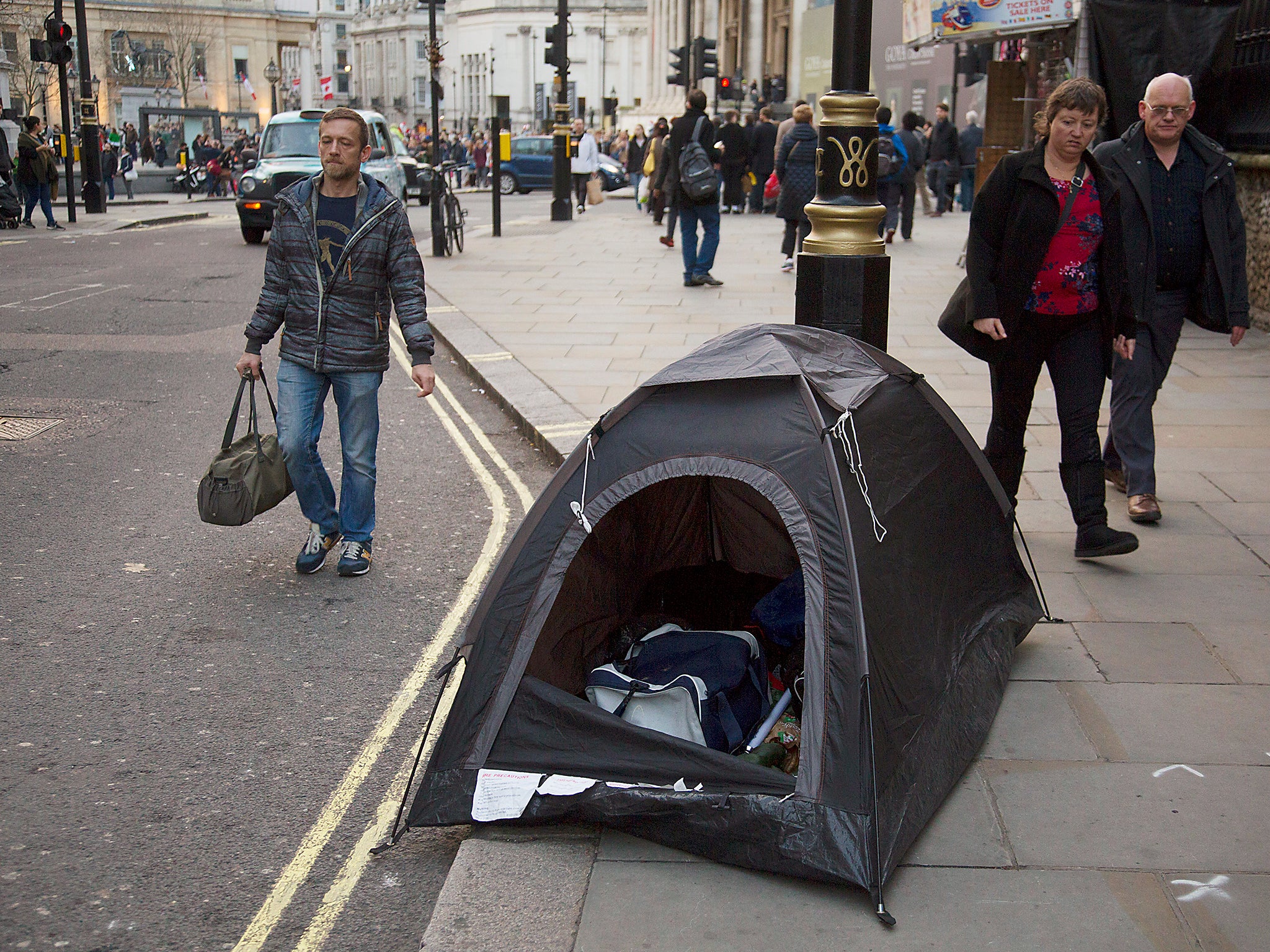More than 9,000 homeless people will wake up on Christmas Day in tents, cars, buses and trains, charity warns
Crisis highlights 'horrifying situations' and says number of 'hidden homeless' will rise by a further 47 per cent in next decade

More than 9,000 people will wake up on Christmas Day in tents, cars, trains and buses as a result of the UK’s homelessness crisis, a leading charity has warned.
Crisis said 9,100 people are “hidden” rough sleepers, in addition to 9,000 more who are sleeping on the streets and 120,000 who will spend the festive season in temporary accommodation.
The number of hidden homeless is set to rise further still, by 47 per cent to 13,400, in the next decade if nothing is done. It has already increased by 57 per cent since 2011, when the figure stood at 5,800.
The finding is based on research carried out by academics at Heriot Watt University.
Those taking shelter in tents and vehicles are often invisible to support workers, meaning they are less likely to be offered help with finding accommodation, healthcare and a job.
They are also especially at risk of violence, with homeless people 17 times more likely to be physically attacked and 15 times more likely to be verbally abused than someone who has a roof over their head.
Crisis warned of people being “hidden from help and trapped in horrifying situations”.
The charity’s shelters are expected to house 4,500 people over the Christmas period, with 11,000 volunteers helping to provide food and shelter.
Some of those forced to sleep on public transport or in tents told Crisis they feared for their safety after being the victims of violence.
One, named Benji, said: “I sleep in the buses, mainly because I can’t see sleeping in the street as… safe. It’s not safe because I have been harassed, I have been kicked. It’s really not a life. It’s like dying every day. It’s no life at all. It’s like hell because [you spend] most of the time alone. I don’t really have many friends. Most of the time is alone.”
Another, Paul, said he had been picked up in his tent and thrown over a subway.
“It was at Christmas time and everyone was going out getting drunk,” he said. “You get more trouble at Christmas, I believe, than any other time. It’s supposed to be a happy time.”
Shelter - Homeless this Christmas
Show all 8Jon Sparkes, chief executive of Crisis, said: “Christmas can be an incredibly difficult time for homeless people. While others are enjoying the company of family and friends, homeless people face a daily struggle just to stay safe and escape the cold.
“For those living in tents and on public transport this battle can last even longer, because they often end up forgotten, hidden from help and trapped in horrifying situations.
“The evidence we are publishing today shows how it is possible to end rough sleeping for good – we’re now calling on our governments to act on this, and make sure no one needs to end up in such dangerous situations in future.”
The charity has published a new report outlining the best policies for tackling homelessness, based on an assessment of initiatives around the world.
It proposes dropping restrictions on which homeless people are entitled for help, and acting swiftly to intervene as soon as someone begins sleeping rough. The most vulnerable homeless people should be given their own home and specialist support, the report says, with help tailored to address their specific needs.
The report was published days after a committee of MPs criticised the Government over its “abject failure” to tackle the “national crisis” of homelessness.
Minsters have promised to halve rough sleeping by 2022 and eradicate it by 2027.
A spokesperson for the Department for Communities and Local Government said: “We are providing over £1bn through to 2020 to prevent homelessness and rough sleeping.
“We are also bringing in the Homelessness Reduction Act – the most ambitious legislation in decades that will mean people get the support they need earlier.”
Subscribe to Independent Premium to bookmark this article
Want to bookmark your favourite articles and stories to read or reference later? Start your Independent Premium subscription today.

Join our commenting forum
Join thought-provoking conversations, follow other Independent readers and see their replies